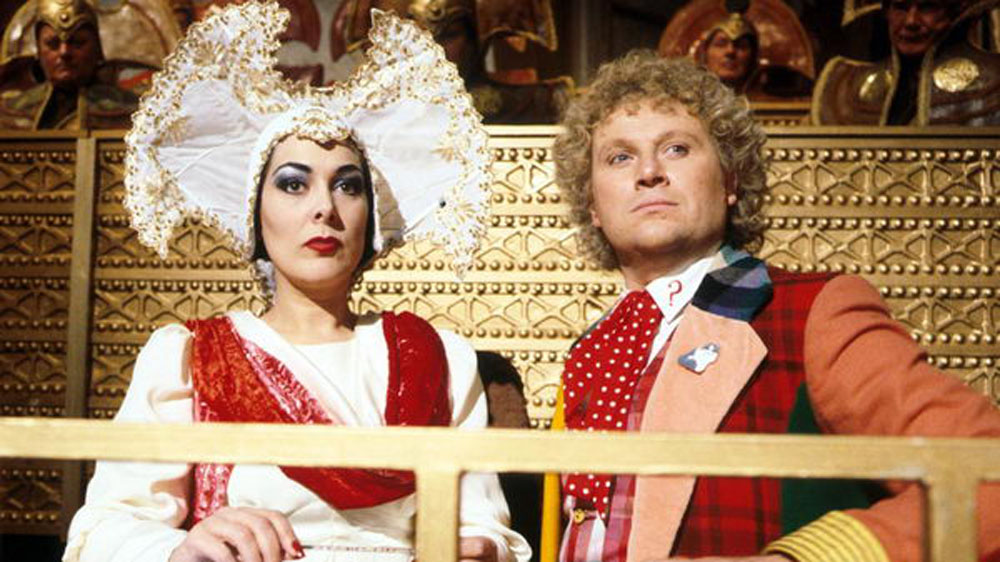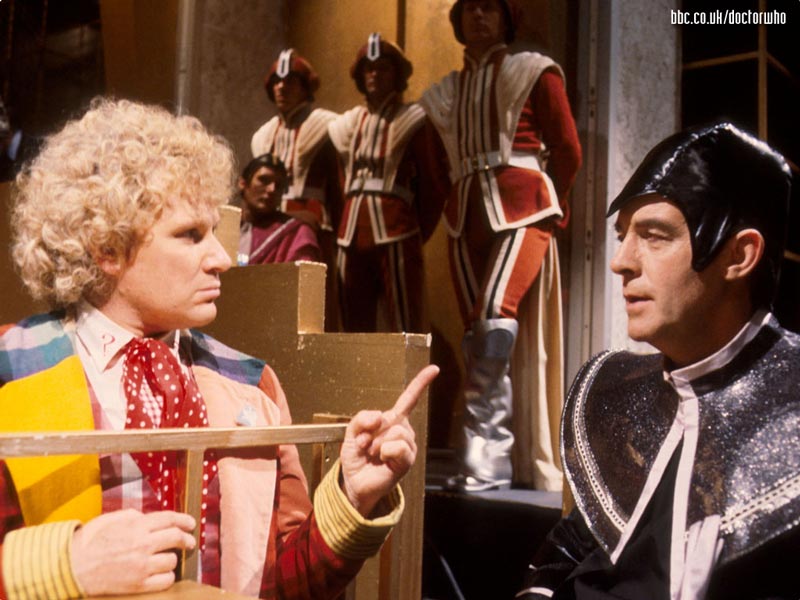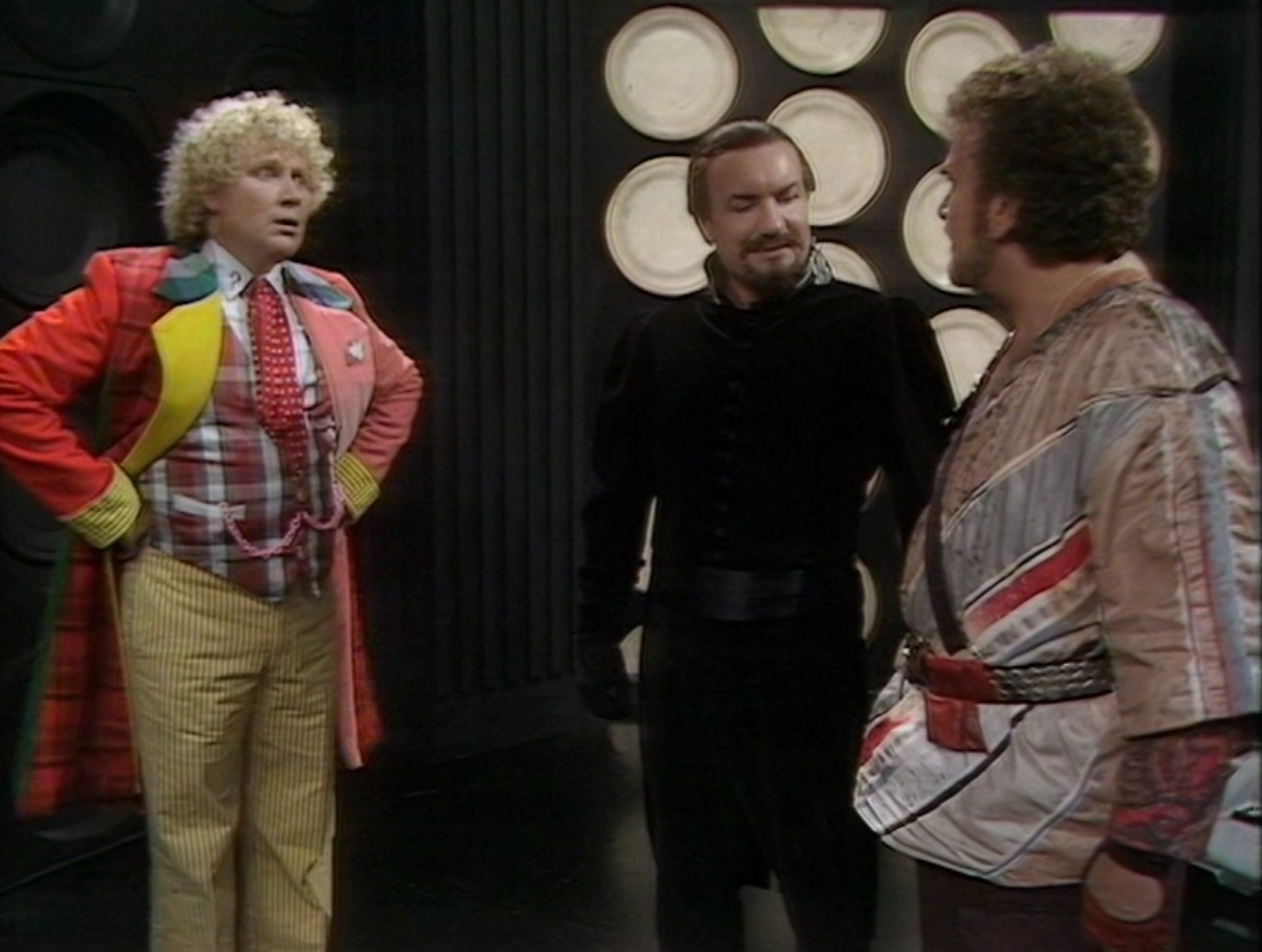Writer Robert Holmes died before he could finish his final Doctor Who story, ‘The Ultimate Foe.’ Here’s what he originally planned for the Season 23 finale.

Actually, ‘The Ultimate Foe’ isn’t strictly the title for Robert Holmes’ final adventure. This was an unofficial title that was given to the final segment of the larger Doctor Who story ‘The Trial of a Time Lord’ which encompassed the whole of Season 23, and Robert Holmes – who helped to devise the overall premise – was commissioned to pen the finale.
Unfortunately, Robert Holmes was writing at a difficult time for the Doctor Who production team. Indeed, the series had been cancelled a year earlier for reasons that are still debated to this day. Officially, the BBC wanted to tone down the violence and rethink the programme’s overall format, but the producer John Nathan-Turner and script editor Eric Saward had been given little guidance as to what else was expected of them, other than to deliver a 14 part series.
Robert Holmes, therefore (along with Saward and fellow writer Philip Martin) came up with the premise of the Doctor being on trial for his life, and ‘The Ultimate Foe’ was intended to wrap-up this trial. Unfortunately, notwithstanding the internal complications at the BBC, Robert Holmes became ill before he could finish his script for episode 13, or indeed work on the story’s final part. He wrote about two-thirds of the 13th instalment, and made a rough plan for episode 14, before he died.

So what, exactly, did Robert Holmes originally have in mind? Well, in the transmitted version of episode 13 (credited to Holmes) it is revealed that the Doctor’s accuser – the villainous Valeyard – is in fact a future incarnation of the eponymous Time Lord, who is conspiring to steal all of the Doctor’s future regenerations. But there is even more going on beneath the surface. The Master is also involved, and has penetrated the Matrix (the Gallifreyan data deposit) from which he has been watching the entire trial play out.
Furthermore, in-keeping with Robert Holmes’ belief that the Time Lord race is rotten to the core, it is revealed that the Time Lords themselves have been up to no good. In order to hide the theft of secret Gallifreyan knowledge from the Matrix, they changed the name of planet Earth to Ravalox and moved it across space. Moreover, they promised the Valeyard that he could have the Doctor’s remaining regenerations if he helped to convict the eponymous Time Lord.
And as episode 13 progresses, the Valeyard escapes into the Matrix where he is pursued by the Doctor and his ‘friend’ Sabalom Glitz, who find themselves in a fantasy version of Victorian London overseen by the mysterious J.J. Chambers and his secretary Mr Popplewick. At the episode’s conclusion, the Doctor is lured onto a beach which is laden with quicksand, and he is dragged beneath the dunes by disembodied hands as the Valeyard cackles, “You are dead, Doctor!”
At this point, script editor Eric Saward took over the reins and strove to complete the final episode from Robert Holmes’ notes. The plan had been for the Master to rescue the Doctor from the quicksand – an unlikely hero, perhaps, but (as he pointed out in episode 13) he had good reason for wanting to keep the Doctor alive; he hoped that the Valeyard and the Doctor would destroy each other and expose the corruption on Gallifrey, “killing two birds with one stone.”
Popplewick would then have led the Doctor into a trap, having been baited by an illusory Mel generated by the Matrix. At which point, Popplewick would have been unmasked as J.J. Chambers, who in turn would have been revealed to be the Valeyard, who would have materialised his own TARDIS around a time vent in the Matrix which, if opened, would wreak havoc on the space-time continuum.
Robert Holmes’ idea, therefore, was for the Valeyard to hold the Time Lords to ransom and force them to grant him the Doctor’s remaining lives. And just to make things more complicated, the Master would then have revealed that he was hired by the Time Lords to murder the Doctor in exchange for a pardon, although he would have ultimately decided not to go through with it.
Episode 14 would have ended with the Doctor bluffing his way into the Valeyard’s TARDIS, and the Valeyard opening the time vent, causing them both to plunge into a time eddy. The Master would then have sealed the vent – saving the universe, but leaving the Doctor and the Valeyard trapped for all eternity.
And this is where the Doctor Who production team hit another stumbling block. The producer John Nathan-Turner was unhappy with this cliffhanger ending, wanting to present a more satisfying conclusion after a 14 week trial. Eric Saward, on the other hand, wanted to preserve the drama of Robert Holmes’ original ending. And because the pair failed to reach an agreement, Eric Saward withdrew his version of episode 14 and declined to give consent for its use. At the same time, he left his post as Doctor Who‘s script editor, leaving John Nathan-Turner without a conclusion.

Nathan-Turner stuck by his conviction, however, that ‘The Trial of a Time Lord’ should end with a clear and definitive conclusion, partly because he was afraid that a cliffhanger ending would give the BBC grounds for cancelling the programme altogether. Thus, the writing team of Pip and Jane Baker were enlisted to come up with their own conclusion using only the information that was available in the first 13 episodes. (Simply put, they weren’t allowed access to any of Robert Holmes‘ or Eric Saward’s notes.)
As such, Robert Holmes’ final Doctor Who story is in some ways only half a story. He laid the groundwork for a finale that was written in record time by the Bakers, and even though it isn’t the clearest of conclusions, in many ways it captures Robert Holmes’ strengths and hallmarks as a Doctor Who writer: the gothic setting, the Time Lord corruption, the humorous patter of the double act of the Doctor and Glitz, to name a few.
And it’s worth remembering that Robert Holmes penned the very first story to feature the Master – ‘Terror of the Autons‘ – and was instrumental in devising the popular villain who still graces our screens today. So it’s pertinent that his final script allowed him to revisit one of the Whoniverse’s darkest and most gentlemanly adversaries.
How do you feel about Robert Holmes’ original plan for ‘The Trial of a Time Lord’? And which is your favourite of his Doctor Who scripts? Let me know in the comments below.








They should have stuck with Holmes’ ending….
But the thing is,the Trial of a Timelord as a whole was pants.
I agree that the Doctor and the Valeyard faking into the Time Vent, (whatever that is) would’ve been too much of a downer for the viewers who’s stuck with it over fourteen weeks. If the Beeb had decided not to renew the show it would’ve the younger audience pretty miserable, like with the ending of Blake’s Seven! The. broadcast version was definitively more satisfying.
“That’s “falling” not “faking”, blame the autocorrect! 😊
Robert Holmes was the greatest of Who writers (ignoring The Krotons) but, the first story to feature ‘The Master’ is clearly The War Games, even if he went under a different name at that point.
Holmes would have made The Master the true hero! He refuses to kill The Doctor which reflects ‘The End of Time’, 24-ish years alter, or is that the other way around? If only he could have told us the definitive answer to the ‘Planet of Fire’ line, “Won’t you show mercy to your own…” (JN-T wanted ‘brother’ but Fiona Cumming cut it off early apparently).
I love Holmes. He wrote on screen Doctors 2 to 6. No other writer was that prolific in Doctor Who. With that being said, I agree with JNT. I really didn’t care for that ending. I’m glad there was a resolution for Trial.
I really wish people understood that the Valyard was in the matrix altering it since the 6th Doctor was acquitted. That means we cannot trust what information the Master found during the 13th Doctor’s series that made him destroy Galifrey. There was no Child.
Edit 7th Doctor Not 6th.
As ‘Trial’ only had 14 26 minute episodes I thought.each episode would have double the budget of series 22. The opening scene made it seem that was the case but then Colin stumbled into another overlit cardboard corridor still wearing the much reviled costume,and the illusion was shattered. Personally, and not withstanding the ‘execution’ (pun intended) I think the concept of another trial was a poor one. The Doctor had served his sentence of exile and was partially pardoned for defeating Omega.
Having read sawards part 14 it’s not great kind of running around with better dialogue than pip and Jane
There’s a time paradox in the bakers version where men having had the adventure with the Dictor on the Hyperion 3 goes off and he hasn’t had the adventure so she’d have it twice
I’d love to see a AI version but it’d only work if the direction showed the fear they’d have rather than it be played for laughs